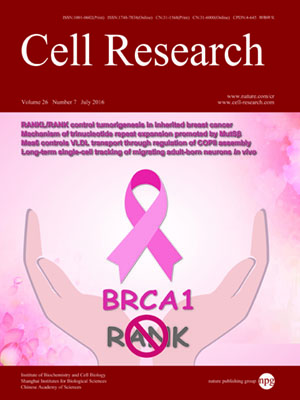
Volume 26, No 7, Jul 2016
ISSN: 1001-0602
EISSN: 1748-7838 2018
impact factor 17.848*
(Clarivate Analytics, 2019)
Volume 26 Issue 7, July 2016: 761-774 | Open Access
ORIGINAL ARTICLES
RANKL/RANK control Brca1 mutation-driven mammary tumors
Verena Sigl1,*, Kwadwo Owusu-Boaitey2,*, Purna A Joshi3, Anoop Kavirayani1, Gerald Wirnsberger1, Maria Novatchkova1, Ivona Kozieradzki1, Daniel Schramek4,5, Nnamdi Edokobi2, Jerome Hersl6, Aishia Sampson6, Ashley Odai-Afotey7, Conxi Lazaro8, Eva Gonzalez-Suarez9, Miguel A Pujana10, for CIMBA11, Holger Heyn9, Enrique Vidal12, Jennifer Cruickshank13, Hal Berman13, Renu Sarao1, Melita Ticevic1, Iris Uribesalgo1, Luigi Tortola1, Shuan Rao1, Yen Tan14, Georg Pfeiler14, Eva YHP Lee15, Zsuzsanna Bago-Horvath16, Lukas Kenner16,17, Helmuth Popper18, Christian Singer14, Rama Khokha3, Laundette P Jones6 and Josef M Penninger1
1IMBA, Institute of Molecular Biotechnology of the Austrian Academy of Sciences, Vienna 1030, Austria
2Department of Biological Sciences, University of Maryland-Baltimore County, Baltimore, MD 21250, USA
3Princess Margaret Cancer Centre, Toronto, Ontario, Canada M5G 1L7
4Lunenfeld-Tanenbaum Research Institute, Mount Sinai Hospital, 600 University Avenue, Toronto, Ontario, Canada M5G 1X5
5Department of Molecular Genetics, University of Toronto, Ontario, Canada M5S 3E1
6Department of Pharmacology, University of Maryland, Baltimore, School of Medicine, Baltimore, MD 21201, USA
7Department of Biological Sciences, Cornell University, Ithaca, NY 14853, USA
8Hereditary Cancer Program, Catalan Institute of Oncology, IDIBELL, L'Hospitalet de Llobregat, Barcelona, Catalonia, Spain
9Cancer Epigenetics and Biology Program, IDIBELL, L'Hospitalet de Llobregat, Barcelona, Catalonia, Spain
10ProCURE, Catalan Institute of Oncology, IDIBELL, L'Hospitalet de Llobregat, Barcelona, Catalonia, Spain
11Department of Public and Primary Care, Centre for Cancer Genetic Epidemiology, University of Cambridge, Cambridge, UK
12Centre for Genomic Regulation, The Barcelona Institute of Science and Technology, University Pompeu Fabra, Barcelona, Catalonia, Spain
13The Campbell Family Institute for Breast Cancer Research, University Health Network, Toronto, Ontario, Canada M5G 1Z5
14Departments of Obstetrics and Gynecology and Comprehensive Cancer Center, Medical University of Vienna, Vienna 1090, Austria
15Department of Biological Chemistry, School of Medicine, University of California, Irvine, CA 92697, USA
16Department of Experimental Pathology and Pathology of Laboratory Animals, Medical University Vienna and University of Veterinary Medicine Vienna, Vienna 1090, Austria
17Ludwig Boltzmann Institute for Cancer Research (LBI-CR), Vienna, Austria
18Research Unit Molecular Lung and Pleura Pathology, Institute of Pathology, Medical University Graz, Graz 8010, Austria
Correspondence: Josef M Penninger, E-mail: josef.penninger@imba.oeaw.ac.at; Laundette P Jones,(LJones@som.umaryland.edu)
Breast cancer is the most common female cancer, affecting approximately one in eight women during their life-time. Besides environmental triggers and hormones, inherited mutations in the breast cancer 1 (BRCA1) or BRCA2 genes markedly increase the risk for the development of breast cancer. Here, using two different mouse models, we show that genetic inactivation of the key osteoclast differentiation factor RANK in the mammary epithelium markedly delayed onset, reduced incidence, and attenuated progression of Brca1;p53 mutation-driven mammary cancer. Long-term pharmacological inhibition of the RANK ligand RANKL in mice abolished the occurrence of Brca1 mutation-driven pre-neoplastic lesions. Mechanistically, genetic inactivation of Rank or RANKL/RANK blockade impaired proliferation and expansion of both murine Brca1;p53 mutant mammary stem cells and mammary progenitors from human BRCA1 mutation carriers. In addition, genome variations within the RANK locus were significantly associated with risk of developing breast cancer in women with BRCA1 mutations. Thus, RANKL/RANK control progenitor cell expansion and tumorigenesis in inherited breast cancer. These results present a viable strategy for the possible prevention of breast cancer in BRCA1 mutant patients.
10.1038/cr.2016.69
FULL TEXT | PDF
Browse 2185


